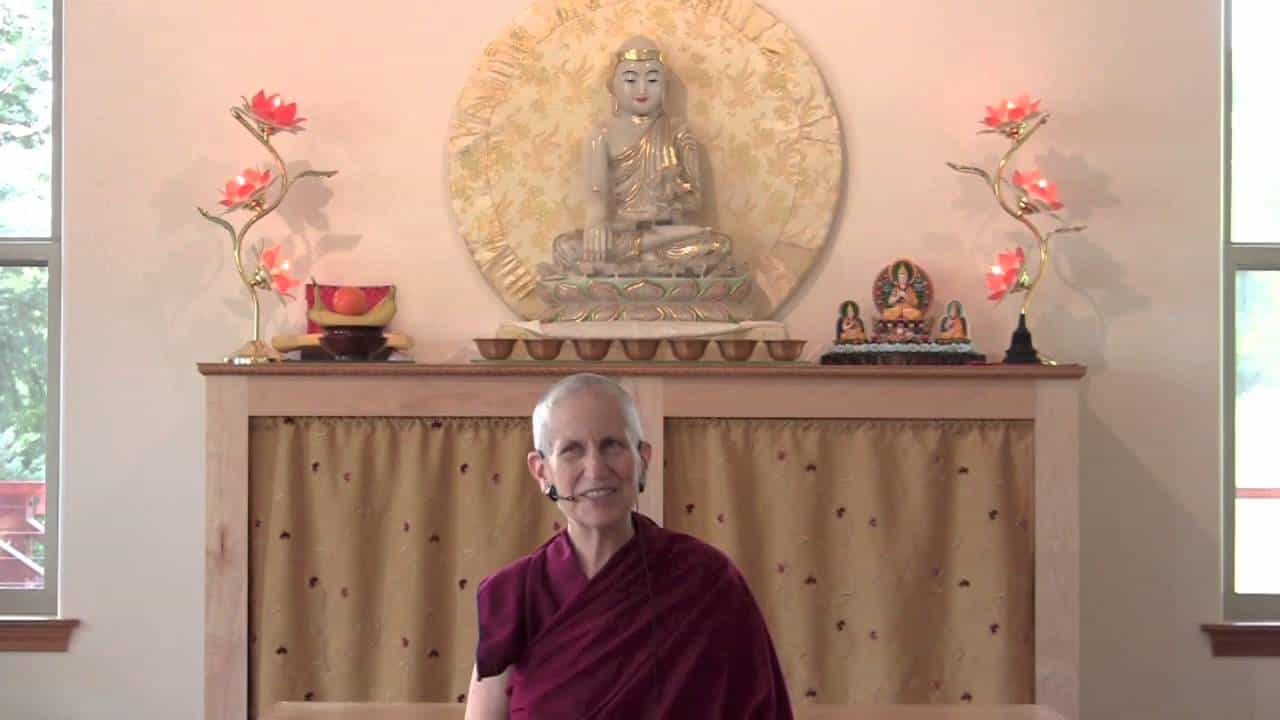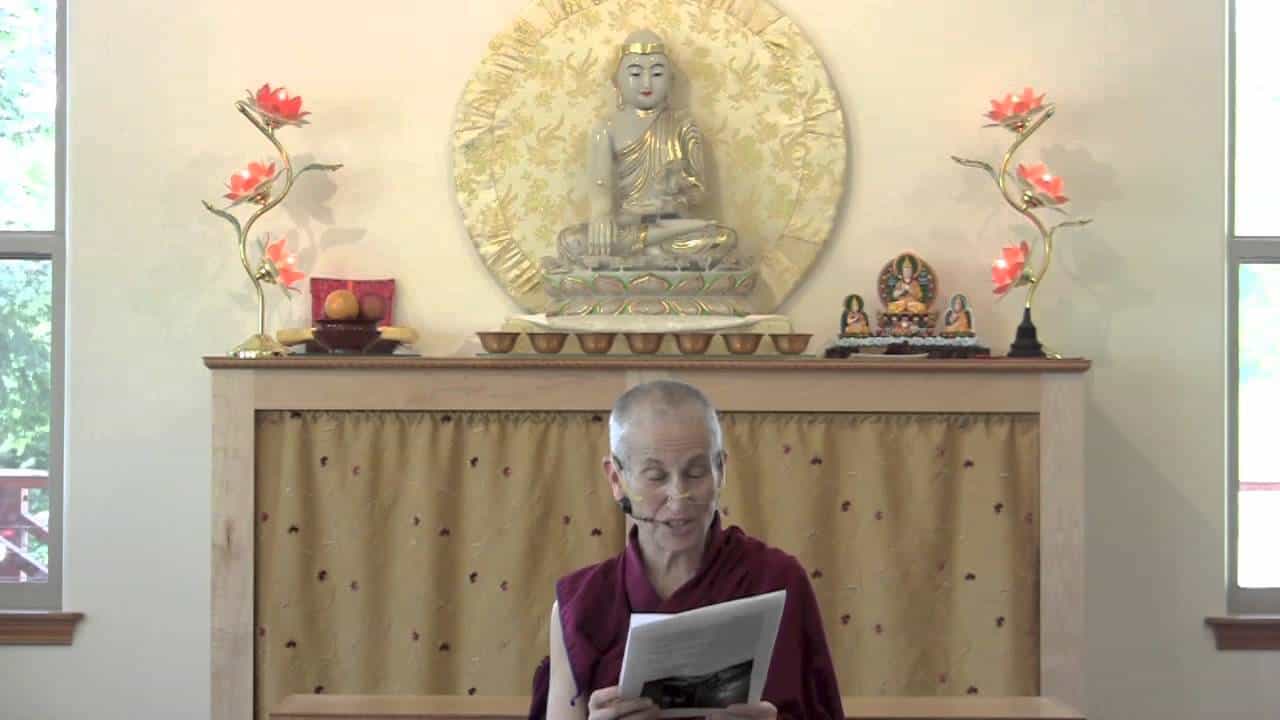Living in the joy of the Dharma
Part of a series of teachings on the text The Essence of a Human Life: Words of Advice for Lay Practitioners by Je Rinpoche (Lama Tsongkhapa).
- Turning away from both external and internal bustle of this life
- Our poverty mentality
- Focusing on the joy of Dharma practice, no matter what others think
The Essence of a Human Life: Living in the joy of the Dharma (download)
We’re on the last verse of the text today, so you can only guess what this topic is.
By the virtue of this advice,
may living beings turn from the bustle of this life,
whose happiness is never enough,
whose suffering never runs out,
to live instead by the great joy of Dharma.
Beautiful dedication verse, isn’t it?
This is a text Je Tsongkhapa wrote, Words of Advice for Lay Practitioners. This is the dedication verse of the text.
He’s saying, by the virtue of this advice (that he’s given in the text), “may living beings turn from the bustle of this life.” Anybody involved in the bustle of this life? The appearance of this life is so strong. Our attachment to this life is so strong. Everything about this life, and MY place in it, is so crucially important. Even we’re Dharma practitioners, still our mind’s constantly around this life. Isn’t it? And what’s Je Tsongkhapa saying? May living beings turn away from the bustle of this life.
By the “bustle of this life” he means not only all this activity we’re doing—we’ve got to do this, we’ve got to do that, go here and go there. Not only that, but the bustle of this life inside here (ourselves), the mind that is spinning around with 10,000 ideas, 50 million regrets, you name it, it’s all going on inside of here. There’s quite a hustle-bustle inside of our own hearts, which makes it difficult…. The external bustle makes it hard to just take in the Dharma because we’re too busy going here and there, and doing this and that, to even stop and listen or retain it. But the bustle in here, inside of ourselves, creates obstacles to really taking the Dharma to heart, because the bustle inside is mostly our self-centered attitude, isn’t it? And our self-grasping ignorance. “I want what I want when I want it, and how can I get what I want, and how can I help my friends and destroy my enemies? How can I look good even though what I did was bad?” This kind of hustle-bustle inside that totally takes us away from the sincerity of our spiritual aspirations.
We do have sincere spiritual aspirations, they’re in there, amongst the hustle and bustle. So to find them and pull them out and treasure them we need to slow down a bit. Not only slowing external this and that and the other thing, but slowing the self-centered mind, the ignorance. Especially attachment to reputation and praise. Boy those two keep us so occupied.
It’s a short line, but there’s a lot of meaning in it. Can you imagine for a minute? “May living beings turn from the bustle of this life.” Just stop. Everything that the newspapers are reporting, all those people, just one hour, turn away from the hustle and bustle of this life. It would be quite remarkable, wouldn’t it? Bad for the economy. Can’t do that. But good for the heart, isn’t it? And probably good for health as well.
And then next line,
The bustle of this life, whose happiness is never enough, whose suffering never runs out
How true. Happiness of this life, whatever we get, not enough.
We kind of go through life with the eight worldly concerns, with this poverty mentality. The happiness I have is never enough. It’s never secure enough. My sense pleasure, never good enough, needs some improvement. My relationships, never good enough. I could use more love. I could use more appreciation. I could use some more praise. Couldn’t you all?
It’s never enough. The happiness is never enough. People don’t recognize how astounding I am and appreciate it from the depths of their hearts. I do so much, I should have more pleasure, but the pleasure goes out to all these other people. Not to me. Because the world is very unfair. That one too, remember? Our first words as children: “It’s unfair.” But the happiness is never enough. Always poverty mentality.
And the problems never run out. What we want, we can’t get enough of. What we don’t want, it comes automatically. Even we try and stop it, one problem after another after another.
We always think, “Oh, as soon as I get this problem solved then I’ll be able to practice Dharma. There’s this problem that’s hindering me right now. We’ll fix that, then I’ll really be able to do some serious Dharma practice.” But you know, as soon as one problem finishes, then all the others that have been waiting in line to be prominent, now one of them becomes number one and we have a new problem to fuss about, to introduce ourselves with: “I’m the person who has the problem of (fill in the blank).” That’s how we create an identity and introduce ourselves.
Wouldn’t it be wonderful—”whose happiness is never enough, whose suffering never runs out”—if we could reverse those in our minds. You know, what I used to keep saying what Lama Yeshe would say about “good enough, dear.” My happiness is good enough. It’s good enough. What I have is good enough. Who I am is good enough. What I do is good enough. I’m satisfied. There’s some contentment in my life. Problems come, opportunity to grow. Instead of problems come, “Ahhh! They’re not supposed to be here get them away!”
What are the thought training teachings all about? Problems: good! You know how they say that when a bodhisattva hears somebody say, “Please could you do this for me,” instead of running out the door as fast as they can pretending they didn’t hear, the bodhisattva says, “Yes! What can I do to help?” So to transform things instead of make them into problems, transform them into ways to practice, to increase our generosity, our compassion.
This is what Je RInpoche is dedicating for, “To live instead by the great joy of Dharma.” Instead of running around trying to perfect the happiness of this life, which we’re never going to succeed in doing, just leave it aside and focus on the joy of the Dharma practice. The Dharma meaning transforming our hearts, transforming what’s inside. To really take joy from our practice and make that the happiness in our lives.
Even though the rest of the world tells us we’re crazy. And they will. But that’s okay. Because from our viewpoint they’re also crazy. Aren’t they? Don’t you feel like you’re living in an insane asylum sometimes in this world when you read the newspaper? I feel like I’m living in a nuthouse. The decisions people make…amazing.
To live by the joy of the Dharma is a beautiful dedication, a beautiful invitation to us.
I thought I’d read the whole thing, because we’re always supposed to start again. So I thought, since it’s so short, I’d read the whole thing again.
The Essence of a Human Life, Words of Advice for the Lay Practitioner by Je Tsongkhapa.1
Homage to my guru, the youthful Manjushri!
To those within her refuge, every happiness and joy,
for those beset by suffering, every assistance.
Noble Tara, I bow before you.“Those adrift on great seas of suffering I will save”–
a powerful vow made good.
To your lotus feet, compassionate goddess,
I offer this bowed head.You of fine features, you have gained
This opportune and leisured human form.
If you follow me who speaks to help others,
listen well, I have something to say.Death will definitely come and will quickly come.
Should you neglect to train your thoughts
again and again on such certainties
you will grow no virtuous mind,
and even if you do, it will be spent
on enjoyment of the glories of this life.Think, therefore, upon seeing and hearing of others’ deaths,
“I am no different, death will soon come,
it’s certainty in no doubt, but no certainty as to when.
I must say farewell to my body, wealth, and friends,
but good and bad deeds will follow like shadows.“From bad will come the long and unbearable pain
of the three lower realms;
from good the higher, happier realms
from which to swiftly enter the echelons of awakening.”
Know this and think upon it day after day.With such thoughts make efforts in refuge,
live as best you can in the five lifelong vows,
praise by Buddha as the basis of lay life.
Take sometimes the eight daylong vows
and guard them dearly.Drunkenness, particularly, is the ruin of the world,
held in contempt by the wise.
Therefore, my fine-featured ones,
it is good to turn from such despised behavior.If what you do brings on suffering eventually,
though it may appear in the moment as happiness,
then do not do it.
After all, food beautifully cooked but mixed with poison
is left untouched, is it not?To the Three Jewels make prayers and offerings each day,
work hard to be wholesome, confess previous wrongs,
strengthen your vows again and again,
dedicating all merit for awakening.To conclude: you are born alone, die alone,
friends and relations are therefore unreliable,
Dharma alone is the supreme reliance.This short life is over, gone in a flash.
Realize that, come what may, now is the time
to find happiness everlasting.
Do not leave this precious human life empty-handed.By the virtue of this advice,
may living beings turn from the bustle of this life,
whose happiness is never enough,
whose suffering never runs out,
to live instead by the great joy of Dharma.
Translation by Gavin Kilty. From The Splendor of an Autumn Moon: The Devotional Verse of Tsongkhapa, Wisdom Publications, 2001. With gratitude to Wisdom Publications for permission to reproduce this text online. ↩
Venerable Thubten Chodron
Venerable Chodron emphasizes the practical application of Buddha’s teachings in our daily lives and is especially skilled at explaining them in ways easily understood and practiced by Westerners. She is well known for her warm, humorous, and lucid teachings. She was ordained as a Buddhist nun in 1977 by Kyabje Ling Rinpoche in Dharamsala, India, and in 1986 she received bhikshuni (full) ordination in Taiwan. Read her full bio.


